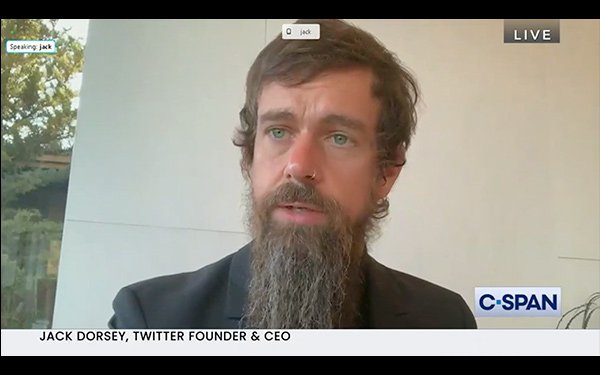
The CEOs of Facebook and Twitter both said at a Senate
hearing Tuesday that they support reforming Section 230 of the Communications Decency Act -- the 26-year-old media law that protects online publishers from liability for how they handle users'
content.
Facebook's Mark Zuckerberg repeated a suggestion he made at a hearing last month, when he said Section 230 could be updated to include requirements that tech companies be
“transparent” about their content-moderation decisions.
Twitter CEO Jack Dorsey's comments about Section 230 largely focused on the way companies use algorithms, with him
suggesting that companies should allow people to wield more control over the use of algorithms.
Toward the end of the four-hour hearing, Sen. Amy Klobuchar (D-Minnesota) asked Dorsey
whether companies should be more transparent with algorithms.
advertisement
advertisement
He responded that transparency would be “helpful,” but challenging to enforce.
“I think a better option
is providing more choice, to be able to turn off the algorithms or choose a different algorithm, so that people can see how it affects one's experience.”
Dorsey also said at the
hearing that Twitter wouldn't have gotten off the ground without Section 230, which shields web companies from defamation lawsuits based on users' comments, as well as from lawsuits for blocking
content.
"If we didn’t have those protections when we started Twitter 14 years ago, we could not start,” he said.
Section 230 has been under scrutiny in
Washington since at least May, when President Trump issued an executive order directing the Commerce Department to petition the Federal Communications Commission for regulations tying companies'
content=moderation policies to Section 230 protections.
Trump issued the order after Twitter alerted users to dubious claims in two of his tweets.
Tuesday's hearing, like one held three weeks ago, was billed as a proceeding to address “censorship”
of speech by tech companies.
As with last month's hearing, several Republicans repeated accusations that the companies suppress conservative speech, while some Democrats questioned why the
companies didn't take a harder line against people who post inflammatory material.
Sen. Richard Blumenthal (D-Connecticut) questioned Zuckerberg over the decision to allow former White House
strategist Steve Bannon to remain on the platform after he suggested in a video post that Dr. Anthony Fauci and FBI Director Christopher Wray should be beheaded. (Bannon later said he was speaking
metaphorically.)
“How many times is Steve Bannon allowed to call for the murder of government officials before Facebook suspends his account?” Blumenthal asked.
The
lawmaker went on to ask Zuckerberg to “commit” to removing Bannon's account.
Zuckerberg declined. “That’s not what our policies suggest that we should do,” he
said, explaining that Facebook doesn't generally ban people unless they've committed multiple offenses.
Some Republican lawmakers at the hearing, including Sen. Ted Cruz (Texas) and Mike Lee
(Utah), repeated their claims that the tech companies blocked content for partisan reasons.
Cruz specifically questioned Dorsey over the labels Twitter was placing labels on some tweets about
alleged voter fraud.
Dorsey replied that the company was simply linking to information about voter fraud.
On Monday, Twitter placed the label “This claim about election fraud is
disputed,” on the following post by Trump: “The Radical Left Democrats, working with their
partner, the Fake News Media, are trying to STEAL this Election. We won’t let them!”
Dorsey also said at the hearing that Twitter won't make exceptions to its content
policies for Trump after he leaves office.
That comment came in response to a question by Sen. Mazie Hirono (D-Hawaii), who asked whether Trump will still be allowed to use the platforms after
January 20, when President-Elect Joe Biden will be inaugurated.
Dorsey said Twitter company makes exceptions to its policies for “global leaders,” those exceptions will no longer
apply once Trump is “not a world leader any more.”